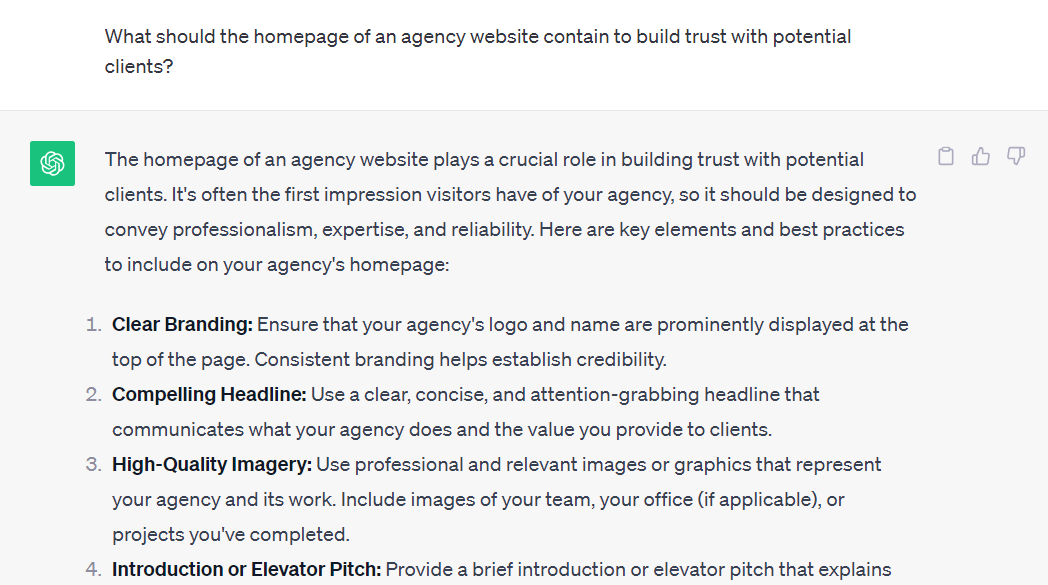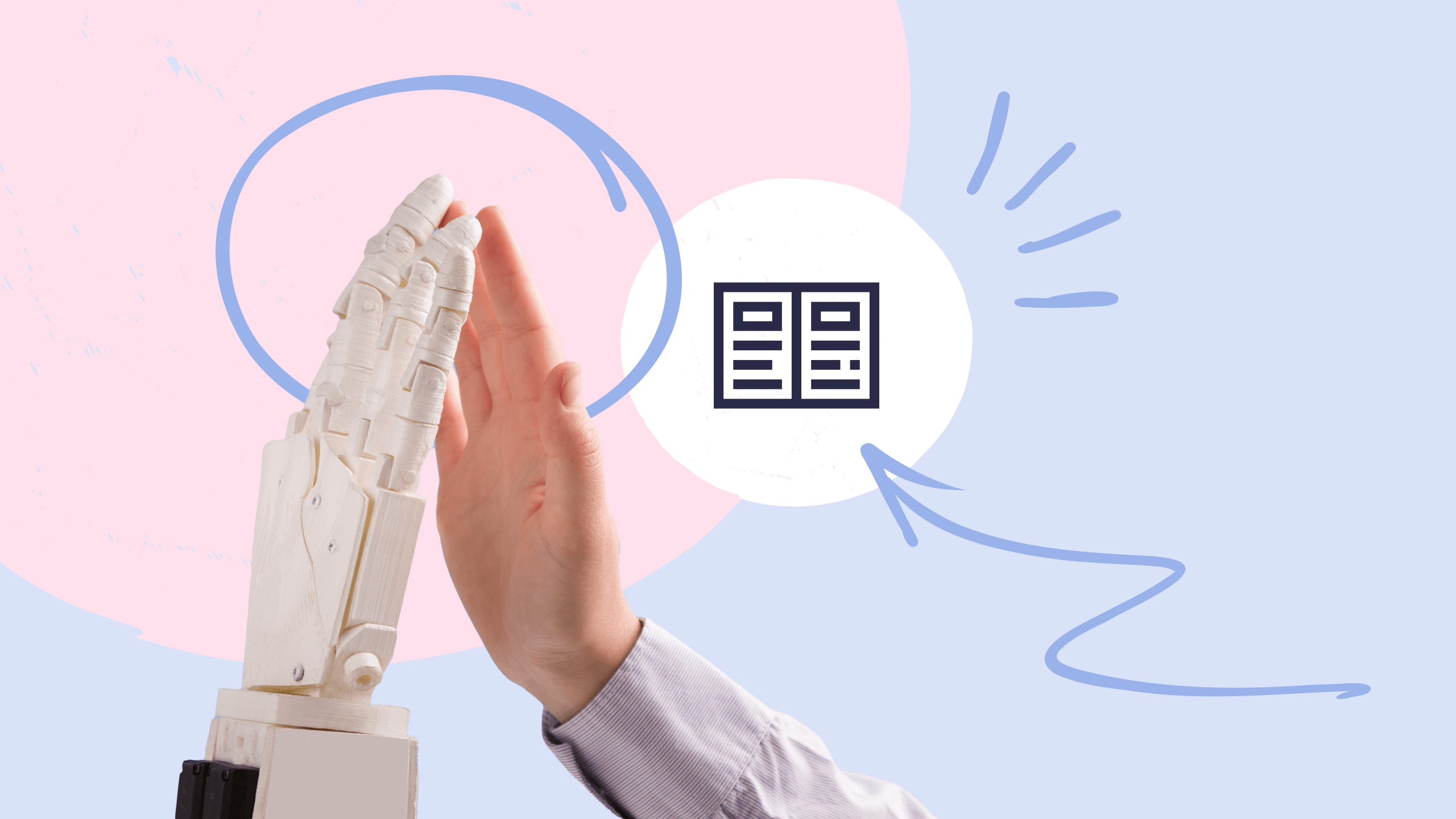WordPress web design is constantly subject to technological changes, just like all areas of the agency world. How can a digital agency make the best possible use of AI technologies to ensure growth for clients, but also for the agency itself? A guest article from our partner agency vereda, including concrete examples and prompts.
The simplified use of artificial intelligence (AI) with the help of chat interfaces is bringing major and drastic changes to the agency business. In this blog post, we look at the impact of artificial intelligence on the development of websites using the example of ChatGPT. And how the daily work of a digital agency is changing as a result.
AI: a tool for precision and efficiency
For some time now, it has been possible to use AI in “daily business” in new ways. The latest developments make it possible to use chat interface solutions and so-called “prompts” to pass on instructions or requests to artificial intelligence in order to obtain the best possible answers.

In addition to being used for programming code, text generated by AI is becoming increasingly important for websites, blogs and landing pages. This raises the following questions:
- How does a digital agency deal with this development?
- And what does this mean for search engine optimisation (SEO)?
ChatGPT: A revolution in content creation
It’s no secret that content in the form of images and especially text is the centrepiece of any website. But creating high-quality content can not only be time-consuming and complex, but above all expensive. That’s why we at vereda – like many other agencies – use ChatGPT as a specific tool for creating text-based content for our clients’ websites.
In addition to the general creation of website texts, we use AI in the context of search engine optimisation. For example, meta information (in the form of meta titles and meta descriptions) and the titles of websites can be exported with the help of Screaming Frog in order to subsequently analyse them for frequency of occurrence with ChatGPT. Or to structure them into keyword clusters. ChatGPT can also be used to expand existing keyword clusters or to research new keywords and synonyms.
In this way, we ensure that our clients’ websites are aesthetically pleasing and thus position the company professionally. On the other hand, we ensure better long-term search engine visibility for the keywords that are relevant to our customers.
Prompt Engineering: The solution for high-quality content
With the help of “prompt engineering”, we want to go one step further in the development of high-quality website content using artificial intelligence. In practice, this means that we have developed various application-specific prompts in collaboration with a so-called “prompt engineer”. These types of prompts are not only much more comprehensive, but are also characterised by the depth of detail of the prompt for ChatGPT.
The influence of AI technologies on SEO
AI-generated content is transforming SEO—discover how tools like Bard and ChatGPT are reshaping digital marketing and how you can stay ahead of the curve.
In addition to a conventional prompt for creating text with the help of ChatGPT, such as “Create a text for a landing page on the subject of a website”, we want to use a practical example to explain the differences to professional prompt engineering.
The devil is in the detail
In order to achieve the best possible result in terms of the quality and tonality of the text with the help of prompt engineering, it is crucial that the prompt is formulated precisely and filled with all the important details and information. True to the motto “input = output”, the more detailed the prompt, the better the result delivered by the AI.
Just as important as the request for the content that should be included in the result of the prompt are clear requests about what should not be included in the result. This ensures that ChatGPT only provides the desired information according to the “exclusion principle” so that it can be inserted directly into WordPress with “copy & paste”. A concrete example of this is the request: “Don’t explain what you are doing”.
Practical example from everyday agency life
Let’s say we have a technical blog post about “additive manufacturing processes in industry”. Creating an effective prompt could consist of formulating a concise question or request so that it indicates to the AI what kind of information it should generate. For example, a prompt could read:
“Explain in a 500-word article how additive manufacturing processes increase production efficiency in the modern automotive industry, with reference to specific technologies and case studies.”
This provides Chat GPT with a clear framework and guidelines for the desired content. It also makes sense to clearly divide up the prompt and clearly define areas such as task, content, objective, style, structure, etc. It is always worth being as specific as possible here. An example of this is
“Task: You receive all the information about the customer. You will use this information to write all the content for the customer’s home page. When writing the content, you will strictly follow the specified structure for home pages, which you will also receive.”
When developing such a prompt, you have to pay close attention to the textual result you want to achieve right from the start. If you brief the AI precisely on this, you will get an almost “perfect” result.
In addition to the examples above, the following prompt can be used to ensure that ChatGPT has all the necessary information:
“If you need more information for the creation of these texts, list these questions in the form of bullet points.”
By using a customised prompt for our needs, we can ensure that the content created by the AI reflects exactly the tone, style and message we need for the specific use case depending on the target audience and page type (blog, landing page, …).
So once you have found the optimal formulation, you can then use the prompt permanently just by exchanging customer-specific information. As a digital agency, you not only get a one-off acceleration of the text production process, but also a reusable process for creating website content.
The human preparation of the content makes the difference
Humans still play a crucial role in writing texts for websites. The successful creation of AI content is just one aspect of the entire process. A central factor lies in the targeted preparation of this content in order to make it both appealing and relevant to readers.
It is advisable to follow a few important steps: Firstly, any content generated by an AI should be subjected to a thorough human review, as even the most advanced technology is not always error-free. Only we humans can judge how good the content is and whether it is correct. And that is the most important thing to consider in the whole process.
Subscribe to the Raidboxes newsletter!
We share the latest WordPress insights, business tips, and more with you once a month.
"*" indicates required fields
Furthermore, care should be taken to ensure that the AI content is harmoniously integrated into existing content strategies rather than differing from existing content in terms of tonality and reading flow. And finally, although many AI tools already produce SEO-friendly content, it is often necessary to further optimise this content for specific keywords or phrases.
AI and SEO at Google
Google has always focussed on providing its users with the best possible and highest quality search results. This suggests that regardless of whether the content was created by humans or by artificial intelligence, quality and relevance always remain of paramount importance.
Our goal here is to successfully utilise AI content and thereby enable our customers to achieve an excellent position in the search results. We must therefore always ensure that we offer originality and real added value for users.
Another topic of discussion in the field of SEO is the risk of being penalised by Google, especially if AI content is used excessively. However, it is not the mere use of AI that is problematic, but rather the way in which it is applied.
For example, the use of AI tools that only aim to duplicate existing content can lead to significant SEO problems such as “duplicate content”. Similarly, excessive integration of keywords – whether manually or by AI – can lead to over-optimisation and the associated poorer positioning.
Our advice? A balanced relationship! At vereda, we see AI as a tool and a starting point, not as a substitute for human thinking and creativity.
It’s about combining the best elements of both worlds to create high-quality, SEO-optimised content that does justice to both search engines and real people. And that help.
Finally, it is also important to emphasise that AI and SEO are not in competition with each other. Rather, they should be seen as partners that work together to increase the effectiveness and efficiency of our online presences.
Future prospects: AI in the digital agency
The possibilities that artificial intelligence offers digital agencies are endless. The use of ChatGPT in our digital agency shows how technology and creativity can go hand in hand.
It is not about replacing human capabilities, but about expanding and improving them. As AI technology continues to develop, we can expect even more impressive applications and implementations in the coming years.
It will therefore remain exciting to see how new technologies change the way we work. In addition to being used for text and content creation, artificial intelligence opens up a wide range of possibilities. It can also be used to create personalised experiences for website visitors by analysing their behaviour and adapting content or design elements accordingly.
One exciting area that we will be looking at more and more in the future is the creation of image content (graphics, images and videos) for websites, for example using tools such as Midjourney. However, we currently see the greatest benefit for us in the creation of text-based content and in the area of search engine optimisation.
The skilful use of AI and tools such as ChatGPT can set new standards in terms of efficiency and quality. Our B2B customers in the manufacturing industry will undoubtedly benefit from this innovation.
We are excited to see how other agencies are utilising the limitless possibilities that AI offers in our industry. Feel free to report back in the comments. The future of web design in B2B is here, and we’re ready to shape it.
Your questions about AI tools in agencies
What questions do you have about the use of AI in agencies? Feel free to ask them in the comments. Would you like to be informed about further posts on the subject of online marketing and WordPress ? Then follow us on LinkedIn, Facebook or via our newsletter.

Leave a Reply